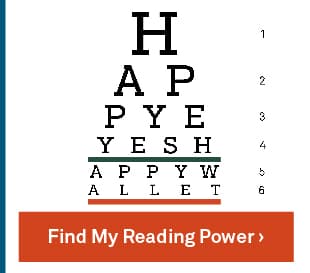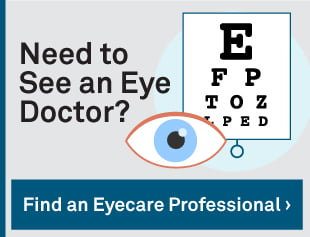 Do I need an eye exam if I don’t wear reading glasses? Simply put: yes.
Do I need an eye exam if I don’t wear reading glasses? Simply put: yes.
We get it, visiting the doctor, dentist, or any other health care provider isn’t everyone’s cup of tea. However, caring for your eyes, whether or not you see the need, is extremely important for your long-term vision.
Routine eye exams detect eye disease and conditions that may have nothing to do with refractive errors, like age-related macular degeneration, glaucoma, and diabetic retinopathy. Symptoms of these and other general health conditions may not show themselves in obvious ways, but they could be putting you at risk.
So, even if you don’t have problems seeing or reading fine print, routine exams can help you rule out underlying conditions that could be affecting your overall health.
These exams can also determine if you would in fact benefit from reading glasses now or in the future — even if it is at a lesser power.
I don’t have vision problems. Do I still need an eye exam?
Even if you’ve never worn eyeglasses or contact lenses, your eyes still deserve the care and consideration of routine comprehensive eye exams. For those who don’t experience vision problems or risk factors — like diabetes or genetic eye conditions — the American Academy of Ophthalmology (AAO) recommends regular eye exams, specifically after age 40.
At this particular age, early signs of disease and major changes in vision may start appearing, according to the Academy. Catching the signs and treating them as early as possible can help your vision.
Around 40, people also begin experiencing presbyopia, or age-related farsightedness. This condition makes it difficult to focus on things up close and read the fine print in books, on labels, and on screens.
Typically, presbyopia can be corrected with a pair of reading glasses, which adds magnification to small objects. Our reading glasses have magnifying powers ranging from +1.00 to +7.00.
Curious if you would benefit from a pair of readers? Try out our power finder.
How often do I need an eye exam after age 40?
Generally speaking, adults between the ages of 40 and 54 who don’t experience vision problems or risk factors, like diabetes, should plan to see their eye doctor every two to four years. This recommendation again comes from the American Academy of Ophthalmology.
If you are between 55 and 64 and still aren’t experiencing vision problems or risk factors, it’s recommended that you have an eye exam every one to three years. For the same circumstances after 65, the AAO recommends scheduling routine exams every year or two.
Of course, everyone’s vision health is different. Depending on your personal vision concerns and medical history, you may need to schedule exams more frequently — but your eye doctor can help you set up a game plan for your vision needs.
Why are comprehensive eye exams important?
Whether or not you wear reading glasses, comprehensive eye exams are the best way to make sure your vision is efficient and that your eyes are in good health.
Comprehensive eye exams tell you more than just how well you can see; they can also detect eye conditions and diseases like glaucoma, macular degeneration, and diabetic retinopathy — all of which affect older adults.
Genetic eye disease is another thing to take into consideration. Some eye diseases and conditions don’t affect people until later in life, and sometimes people are unaware that they have them because they don’t always present themselves clearly. The sooner an error in vision is detected, the sooner it can be treated.
What happens during a comprehensive eye exam?
During a comprehensive eye exam, an ophthalmologist or optometrist is checking the overall wellness of your vision. You will be asked to read an eye chart to determine if your vision (both near and far) needs correction. Your eye doctor may also:
- Test the alignment and movement of your eyes.
- Measure your depth perception.
- Check your peripheral vision.
- Check for signs of glaucoma with an “air puff” test.
- Evaluate your retinas and optic nerves for any sign of damage or disease.
How long does a comprehensive eye exam take? Comprehensive eye exams typically last between 45 and 90 minutes.
Reading glasses may not be part of your current vision plan, but if they are in your future, we’re here for you with many styles, colors, and lens powers to choose from. Until then, be sure to take care of your eyes and general health with routine comprehensive eye exams.
Are you due for a comprehensive eye exam? Find an eye doctor near you to make an appointment.
RELATED ARTICLES :
What Vision Expenses Does My FSA Cover?
HSA and FSA Account: What You Need to Know






0 Comments